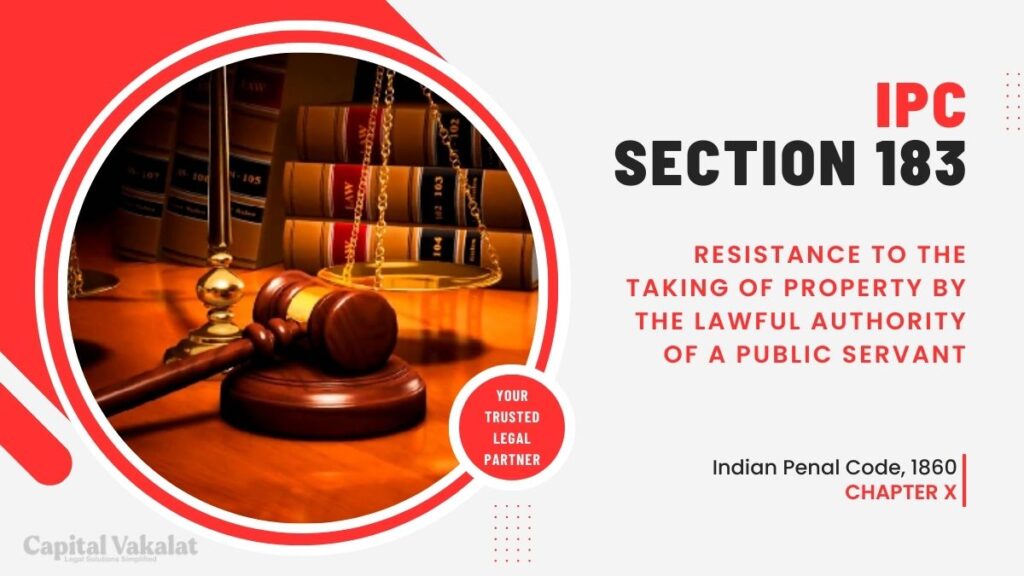In this article, we will delve into Section 183 of the Indian Penal Code (IPC), which deals with the offense of resisting the taking of property by the lawful authority of a public servant. This section is essential in maintaining law and order, as it ensures the authority of public servants is respected.

Let’s explore the details of Section 183 IPC and its implications.
Understanding Section 183 IPC
Section 183 of the IPC is a legal provision that criminalizes any act of resistance or obstruction in the execution of legal processes or the exercise of powers by public servants. The intention behind this section is to prevent any hindrance to the lawful actions of public servants, which are vital for the administration of justice and maintenance of law and order.
Elements of Section 183 IPC
To establish an offense under Section 183, the prosecution must prove the following elements:
- Resistance or Obstruction: The accused must have actively resisted or obstructed the public servant in the discharge of their duty.
- Lawful Authority: The public servant must be acting within the scope of their lawful authority. If their actions are not authorized by law, the section may not apply.
- Knowledge or Reason to Believe: The accused must have knowledge or a reason to believe that the person obstructed is a public servant and that their actions are lawful.
Punishment for Offenses Under Section 183
Offenders under Section 183 IPC can face imprisonment of up to six months or a fine, or both. The punishment may vary depending on the gravity of the obstruction and the circumstances of the case.
Defenses Against Section 183 IPC
There are certain defenses available to individuals accused under this section. Common defenses include lack of knowledge about the public servant’s authority, acting in self-defense, or protecting one’s property.
Recent Cases and Interpretations
Recent cases have shed light on the interpretation and implementation of Section 183 IPC. The courts have been emphasizing the need to balance individual rights with the necessity to respect the authority of public servants.
Significance of Section 183 IPC
Section 183 plays a vital role in upholding the rule of law. It ensures that public servants can perform their duties without fear of obstruction, which is crucial for maintaining a just and orderly society.
Challenges in Enforcing Section 183 IPC
Enforcing Section 183 can be challenging, as it requires a careful balance between individual rights and the authority of public servants. Issues such as excessive use of force or wrongful exercise of authority can complicate cases.
Impact on Society
The proper application of Section 183 IPC is essential in a democratic society. It fosters respect for the law and public servants, contributing to a more orderly and just community.
The Need for Awareness
Public awareness about Section 183 IPC is crucial. People should be informed about their rights and responsibilities when dealing with public servants to avoid legal complications.
Conclusion
In conclusion, Section 183 of the Indian Penal Code serves as a cornerstone in upholding law and order by preventing any resistance to the taking of property by the lawful authority of a public servant. It is vital for maintaining a just and well-functioning society.
Frequently Asked Questions
Can a person resist a public servant if they believe the action is unlawful?
Section 183 may not apply if there is a genuine belief that the public servant’s actions are unlawful.
Are there any recent amendments to Section 183 IPC?
As of my last knowledge update in September 2021, there were no recent amendments. Please verify with the latest legal sources.
Can self-defense be a valid defense against Section 183 charges?
Yes, if a person can prove that they acted in self-defense, it may be considered a valid defense.
Why is it important to raise awareness about Section 183 IPC?
Raising awareness helps people understand their rights and responsibilities, reducing the likelihood of legal complications when dealing with public servants.